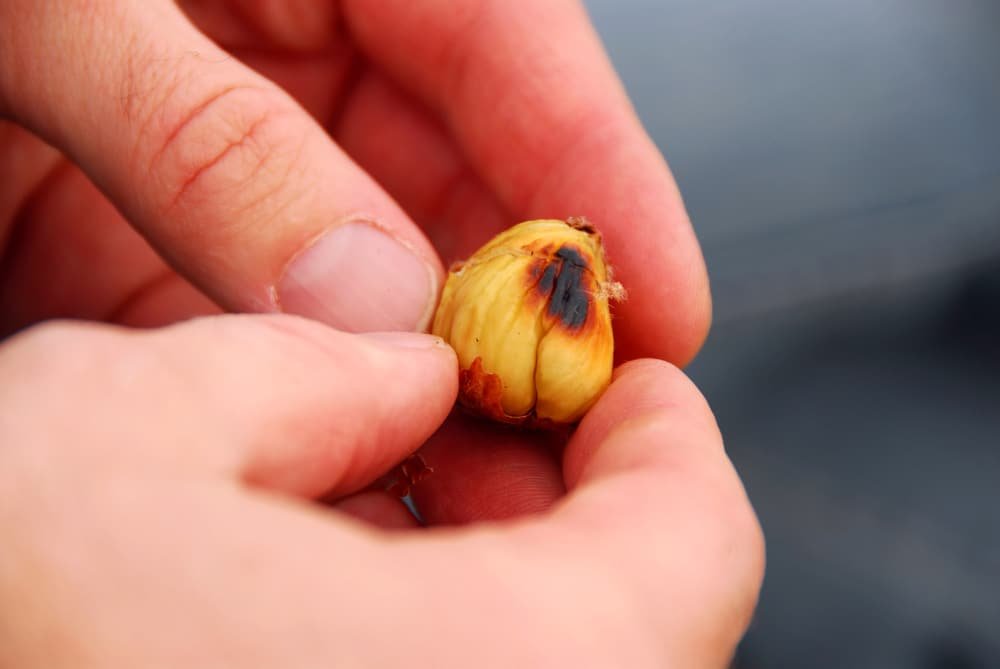There is no nut quite like chestnuts with their sweet and buttery flavour making them the perfect addition to a variety of dishes. Their season, however, is short. And they can be fiddly to prepare. So, how can you keep them for the long term?
Can You Freeze Chestnuts?
Yes, you can freeze chestnuts for up to 9 months. Do all the prep work to freeze chestnuts first, so get your chestnuts peeled. Once peeled, you can freeze them on a baking tray first, then bag them up.
Do Do Chestnuts freeze well? Yes
Can you refreeze Chestnuts? No
How To Prepare Chestnuts For Freezing
Before you freeze chestnuts, you need to prepare them. Although you can throw unprepared chestnuts in the freezer in their shells, there’s simply no point. Instead, do the prep work first so that you have ready to enjoy chestnuts in the freezer.
To get them prepared for the freezer, follow these simple instructions:
- Select and Wash: Pick healthy, mature chestnuts. These have a shine, are firm to the touch, and do not bend or crack when pressed then wash your chestnuts.
- Score: Score the chestnut skins on one side – ensure not to pierce the nut below. This can be done carefully with a knife or scissors. Give your chestnuts a gentle squeeze to ensure you have broken the skin.
- Soak then Boil: Soak the scored chestnuts in filtered water for 2 hours. After 2 hours, transfer chestnuts to boiling water and boil for 2 minutes. Meanwhile, have a dry saucepan heating.
- Dry Then Toast: Transfer boiled chestnuts to a dry towel and pat dry. Transfer chestnuts to the warm saucepan and cover with a lid for 30-60 seconds This will cause the chestnuts to open on their own.
- Peel: Transfer opened chestnuts to a towel and peel while hot, be sure to wear heat-resistant gloves to protect your hands from burns.

How to Freeze Peeled Chestnuts
Now that you have perfectly peeled chestnuts, you can get to freezing them using the method below:
- Flash Freeze: Place the peeled chestnuts onto a freezer-safe baking tray approximately 1 centimetre apart and freeze for several hours. You may want to wrap the tray in cling film.
- Bag Up: Once they have frozen solid, tip the chestnuts into a freezer-safe bag or container. A bag will work better here as you can remove the excess air, and a bag will take up less space.
- Seal: Tightly seal the bag, pushing out as much of the excess air as possible as you do so.
- Label and Freeze: Don’t forget to label and date the bag, then place the bag into the freezer.
Yes, vacuum packed chestnuts can be frozen for around 6 months. You can leave them in the vacuum pack and pop them directly in the freezer but you’ll need to defrost and use them all at once.
3 Tips for Freezing Chestnuts
Now you know how to freeze them, we’ve got our 3 top tips which we strongly recommend following when freezing chestnuts to have the best results:
Freeze Them Peeled
Freezing any food is all about saving time. Freezing them peeled means all the fiddly prep work is done for you, so when you want to enjoy chestnuts, you can.
Roast Afterwards
Chestnuts toasted over an open fire are the epitome of Christmas. But if you want to toast them, then do so after removing them from the freezer. If you roast them beforehand, you’ll find the flavour degrades faster.
Cook from Frozen
If you’re making stuffing, filling or paste from your chestnuts, you don’t need to defrost them. You can grab them from the freezer and put them straight into the pan.
How Long Can You Freeze Chestnuts?
When freezing chestnuts, it is always recommended to use air-tight bags or containers. A vacuum-sealed bag will not only last longer but help retain original flavours when freezing.
The best part about chestnuts is that they can be frozen raw or cooked and last from 6-9 months.
As always when freezing any fresh foods, be sure to clearly label each container with what is in the package, along with the date it was frozen.
Fresh chestnuts will keep for between 2 and 3 weeks in the fridge. If you need to extend this shelf life, then the freezer is a great option.
How Do You Defrost Chestnuts?
Once you’re ready to cook with chestnuts, it’s time to take them out of the freezer. Like other fruits and nuts, you can cook with your peeled frozen chestnuts right away to make some delicious meals.
If you prefer to defrost them first, you can do so at room temperature or in the fridge.
For chestnuts in the shell, it’s best to let them defrost at room temperature for several hours. This will prevent them from retaining moisture and becoming mushy. Once fully defrosted, you can cook with your in-shell chestnuts as normal.
Can You Refreeze Chestnuts?
Refreezing chestnuts is not something we would recommend. It will drastically ruin the texture and flavour even if it is likely to be safe to eat them.
The only exception to this advice is if you have frozen chestnuts then made stuffing or filling from them that you then want to freeze. You’ll be fine to freeze it in this way even if they have previously been frozen.
Do Chestnuts Freeze Well?
Nothing beats freshly harvested Chestnuts.
That being said, chestnuts do freeze really well and will maintain much of their original flavour. There is a slight difference in texture, which is to be expected after freezing.
Following the defrosting instructions will help preserve your chestnuts texture and flavour as they become sweeter as they dry.
Related FAQs
If you’ve still got questions about freezing chestnuts or chestnuts in general, then these may help:
You can freeze chestnut stuffing. You just need to make it as you usually would before storing it in a freezer bag. Before placing the bag in the freezer, remove as much air from the bag as possible before placing it in the freezer. Make sure you defrost it entirely in the fridge overnight.
Freezing roasted chestnuts is doable but not advised. Freezing can ruin the nutty texture and flavour, so we advise against it. Instead, freeze them as above and then roast them later and enjoy them warm.



It doesn’t really matter, but the very first “look, here are some chestnuts” picture on this page shows *horse* chestnuts which are not, in fact, true chestnuts.
I imagine they can be frozen, but I can’t imagine why you’d want to as they are toxic to humans.
That’s some fine researching right there…????
With compliments of the season
Great spot Ian! We’ve fixed this now.